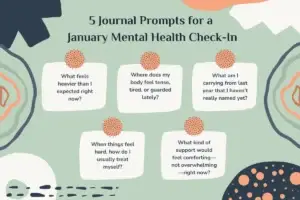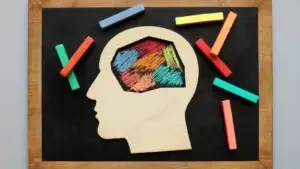Do you struggle with anxiety and depression? You’re not alone. Many adults face these challenges due to life changes, relationships, and trauma. But there is hope. Dialectical Behavior Therapy, or DBT, is a powerful tool that can help you cope with anxiety an depression. In this blog post, we will explore what DBT is, its core components, and how it can benefit your mental health.
What is DBT?
Imagine having a toolbox that could help you handle really tough emotions, keep your relationships strong, and stay calm and focused even when things get super stressful. That’s what Dialectical Behavior Therapy, or DBT for short, is like.
It’s a special kind of therapy that mixes together some ideas from cognitive-behavioral therapy (that’s a way to help you change negative thoughts and behaviors) with mindfulness practices (which is all about living in the moment and being aware of your thoughts and feelings without judging them).
In DBT, you can learn through both one-on-one therapy with your therapist or group sessions where you practice new skills with others. It’s kind of like learning to ride a bike – at first, you need someone to show you how and to hold onto the bike, but with practice, you’ll be able to ride smoothly on your own. DBT helps you build that balance and control in your emotional life, making the ride of life a lot less bumpy.
The Core Components of DBT
DBT is like a four-person team where each member brings a special skill to help you tackle tough emotions and situations. Let’s break down these four super skills:
- First up, we’ve got Mindfulness. Think of this as your ability to stay in the here and now. It helps you pay attention to what’s happening inside you (like your thoughts, feelings and physical sensations) and around you, but in a relaxed way.
- Next is Distress Tolerance. Sometimes life throws you curveballs, and things get really tough. Distress Tolerance is like having an emotional shield that helps you deal with the hard stuff without losing your cool or acting on impulse. It’s about getting through the tough times without making them worse.
- Then, we have Emotion Regulation. This skill is all about understanding and managing your feelings. It’s like being the boss of your emotions, so they don’t take over and run the show. You’ll learn how to change emotions that you want to change and ride out the ones you can’t.
- Last but not least, there’s Interpersonal Effectiveness. This is your toolkit for dealing with other people. It helps you ask for what you need, say no when you have to, and handle conflicts in a way that respects both you and the other person. It’s all about building strong, healthy relationships.
Together, these four skills form the heart of DBT, giving you what you need to face life’s challenges with confidence.
Mindfulness in DBT
In DBT, mindfulness helps you deal with tough moments. Picture this: you’re walking through a video game, and suddenly, you’re surrounded by obstacles and distractions. Mindfulness helps you stay focused, keeping your eyes on the path ahead without getting caught up in the stuff trying to knock you off course.
It’s all about noticing what you’re feeling and thinking at any given moment, but instead of getting upset or trying to push those thoughts away, you just let them be. It’s like being the calm center in the middle of a storm.
You learn to recognize what’s going on inside you—your thoughts, feelings, and sensations—and accept them without judgment. This doesn’t mean giving up or saying everything’s fine when it’s not. It’s more about understanding that you can experience tough emotions or situations and still keep your cool, making it easier to figure out what to do next.
So what does practicing mindfulness look like? For some, this might be a body scan meditation, being present in nature, or paying attention to your breathing. By practicing mindfulness, you get better at handling life’s challenges without getting overwhelmed.
Building Distress Tolerance
Building Distress Tolerance is like mastering the art of being calm in stressful and difficult situations. Imagine you’re playing your favorite video game and you hit a level that seems impossible. Everything is coming at you fast, and it’s super easy to freak out. Distress Tolerance is about learning to keep your cool and move through that level without hitting the panic button.
It’s like having a set of mental armor that protects you when life throws challenges your way. You learn techniques that help you say, “Okay, this is really hard, but I can get through it without losing my mind.”
These techniques include simple stuff that can make a big difference in the heat of the moment. Examples are:
- taking deep breaths or practice square breathing
- counting to ten
- using your five senses to self soothe
- imagining your happy place
- exercising
- splashing cold water on your face
What’s great about building Distress Tolerance is that it’s not just about toughing it out or ignoring your feelings. It’s more about recognizing, “Yes, this is hard. Yes, I’m feeling really stressed or upset right now. But I have tools to help me deal with this in a healthy way.”
This skill set helps you to not act on impulse, like lashing out in anger or giving up. Instead, you learn to pause, take a step back, and handle things with a clearer head. It’s about facing life’s storms without letting them knock you down.
Emotion Regulation with DBT
Think of Emotion Regulation in DBT like being the captain of your own ship in a stormy sea of feelings. It’s all about figuring out what your emotions are trying to tell you, and then deciding the best way to respond, instead of just reacting without thinking.
This part of DBT gives you skills to understand your feelings, recognize what’s causing them, and then use strategies to calm them down.
You know how sometimes an emotion hits you like a wave, and it feels like you’re just stuck riding it out? Emotion Regulation teaches you that while you can’t always control the wave, you can learn to surf.
Some examples of activities to help with emotion regulation include:
- STOP techniques
- having positive self talk
- engaging in a favorite activity
- taking care of your physical health, including healthy eating, adequate sleep, and exercise
- doing something that is the opposite of the emotion you are feeling. For example, if you are feeling angry, try doing something nice for someone or walk away from the distressing situation.
And it’s not just about dealing with the big, overwhelming emotions. It’s also about noticing the good moments and making the most of them. This helps balance things out, so life’s not just about handling the tough stuff, but also about enjoying the good. With practice, managing your emotions becomes easier and more natural, helping you keep your cool and make wise choices on daily basis.
Interpersonal Skills in DBT
Interpersonal Skills in DBT are all about improving how you talk and connect with the people around you. You get to work on things like asking for what you need without feeling scared or guilty, and saying no in a way that doesn’t hurt someone’s feelings. It’s kind of like learning the art of conversation and relationship-building.
Let’s say your friend asks you to hang out, but you have a ton of work to do. Instead of just saying yes and stressing out later, DBT teaches you how to explain your situation and maybe even plan for another time. It’s all about making sure you’re heard and respected, without causing unnecessary drama.
These skills also help you handle tricky situations, like if you’re arguing with someone. DBT gives you the tools to calm things down, share your side of the story, and listen to theirs. By doing this, you’re not only keeping the peace but also making your relationships stronger and healthier.
Applying DBT to Everyday Life
Putting what you learn in DBT into your everyday life can really change things for the better.
Every day, you can use mindfulness to stay cool and focused, no matter what’s happening around you.
If things get super tough, your distress tolerance skills are like having a secret weapon to stay calm.
When emotions try to take over, remember you’re the boss – you can manage them with the tricks you’ve learned.
And talking to people gets easier too, because DBT teaches you how to say what you need and listen to others, making every conversation a win-win.
DBT in North Carolina for Anxiety and Depression
DBT is an excellent tool for people struggling with anxiety and depression. Our team of caring therapists understands the difficulties you may have, and we would be honored to support you in creating lasting positive change through use of DBT. We are happy to offer support from our North Carolina based practice. To start your therapy journey, please follow these simple steps:
1. Fill out this consult form.
2. Read about our skilled therapists.
3. Begin cultivating lasting change
Other Services Offered With Renewed Wellness Counseling
We are happy to offer a variety of services in support of your mental wellness from our New Bern, NC-based practice. Our therapists specialize specifically in therapy for military families, chronic illness counseling, and addiction counseling. We are also happy to offer life transition counseling, anxiety treatment, and trauma therapy. In fact, we can help you wherever you are in the state with online therapy in North Carolina and South Carolina. Feel free to learn more about us by visiting our blog or FAQ today.








